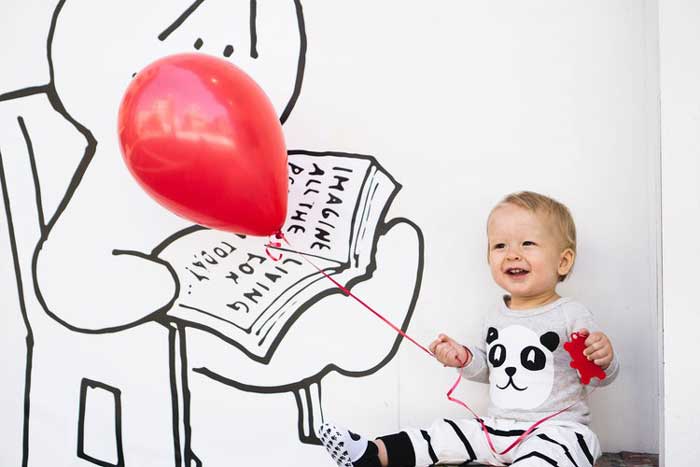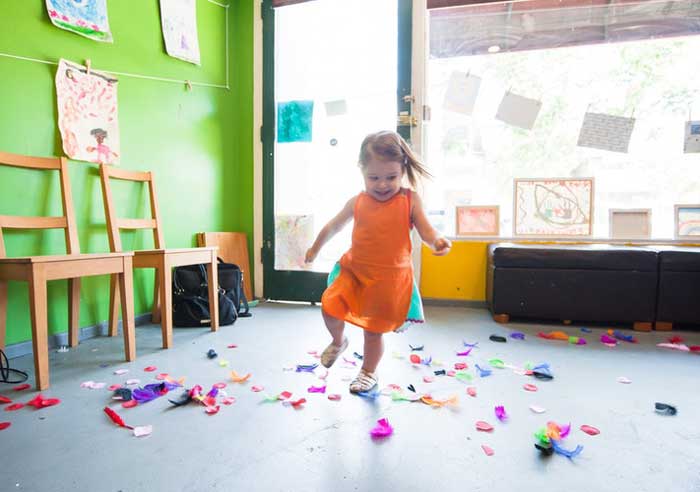Toddlers’ Moods: Why Are They Unpredictable?
You know how it is: they were all smiles, you turned away, then turned back – and they are already tearful. Can one understand these sudden mood changes?
 It’s only natural
It’s only natural
If you can depend on anything in this life, you can depend on your toddler swinging from one mood to the opposite at a moment’s notice. When your two-year-old looks happy, satisfied and all in smiles, you can be sure that the mood can change in a matter of minutes.
While you may feel responsible, wanting to be able to control the swings and therefore frustrated, the truth is that most of these roller-coaster changes are but natural, constituting a part of the growing process. Although they may be quite noisy and inconvenient, they shouldn’t be confused with acting up. If you drove to the store to treat your toddler to his favorite sweets and upon arriving there discovered that he doesn’t want anything, you are justified in feeling irritable – yet for your little one it is just one of those things, put out of mind as soon as it happened.
The more you are aware of the reasons behind his ever-changing attitude, the better you will be able to stand the shifts and help your little boy or girl cope with their ups and downs.
You believe your toddler is already a star of the drama? And their effervescent shifting from one mood to the other is pure and simple desire for unflagging attention? Probably so, but there’s much more to it than that, and the reasons are closely linked with their development.
Reason one – they are unable to express their wants clearly and unequivocally
They are so little, living in the world for up to three years only, and everything around them is gigantic, unfathomable, and often inexorable. You may regard it as charming, but bearing in mind that our kids don’t stand three feet and know only about two dozen words, they must feel pretty much frustrated with communication.
Picture yourself your boy playing happily with his crayons and taking one after another to color a picture. Then, out of the blue, he freaks out – why, when everything was completely all right? The reason is simple: he cannot communicate to you his want to find or to get a crayon of a particular color, his wish to have a broken one or a dirty one changed. He would be glad to go on with his game, but he would like it to run more smoothly.
How to set things right. It is not always that you can understand what the toddler wants to be done – and there’s no way to get around it, so it’s no fault of yours or the toddler’s. Remain cool and try to help him deal with the situation – pick up things he may want, name them, hold them out or point to them. You might hit upon what has gone wrong, and you will enlarge his vocabulary thus facilitating your future communication.
Reason two – they don’t understand time
The continuation of time taking us from one situation to another is not something a toddler understands as well as we do. In fact, it’s totally beyond their comprehension. When the kid wants to drink he would like his juice to appear in his hand this very instant. If it fails to arrive, there might be thunder and lightning out of a clear sky.
How to set things right. Toddlers’ having no understanding of time can be used by you advantageously. For that very reason, they can be diverted easily. It is advisable for you to have various means of distraction always at hand. If the juice is not forthcoming this very minute, the toddler can get engrossed in watching colorful bubbles or handling a toy. There’s no need for a theatrical performance to turn their mind to other things – by this time you surely know what sort of things appeal to their imagination.
Reason three – they are not good at handling their emotions
At this tender age, the little one has no experience how to deal with the onsets of various emotions that suddenly overwhelm him and carry him on the tide. Before they are aware of them, emotions have them in control! Say the kid is enjoying his time in the tub – then his parent decides it’s time to cease. This comes unexpected and certainly unwelcome, and the kid hasn’t had time to gather his wits about him, but he is already expressing his reluctance to leave by splashing the water about and yelling.
This reaction is natural because the toddler is not yet able to reason with himself and he doesn’t see the future beyond his current outburst. He hadn’t the time to think about prospective pleasures that await him outside the bathroom. Soon he will be satisfied with listening to a story or playing with his favorite toy.
How to set things right. Explain to him in a calm voice that he can’t remain in the tub forever because there are other things for him to do. Then, teach him to recognize his emotions by stating them. Say something along the line: “I see you are enjoying your bath and want it to continue, so you feel angry.”
The child won’t relate your words to his emotions so quickly, so this is a practice you will have to follow pretty often if you want your toddler to eventually learn to discover the connection between words and feelings, but when it happens he will be able to better communicate his emotions to you.
Reason four – they can’t move from one task to another smoothly
Here’s another frequent reason behind mood ups-and-downs that get a grip on the kid: transiting from one activity to another. The world looks so diverse and prone to unexpected changes to our kids, and their attempts to adapt to it require much mental and physical energy. When we think that they are not so deeply engrossed in what they are doing at the moment, they may actually be concentrating more than it looks outwardly.
We are much more capable of switching to our next task from the previous one, but even then it takes us some effort to do it. Meanwhile, our children concentrate much harder and cannot very well move on from what they are doing at a moment’s notice.
How to set things right. Toddlers can grasp sequences, and you can make use of this ability. They can understand that one thing succeeds another, and when you want them to shift from one activity to the next, ease the process by giving early warnings and repeat them quite often.
For instance, when in the tub, comment on the process in the way like: “We’ll now wash your hair and rinse it, after that it will be time to get out of the tub.” It’s really a big question, because your toddler is going to have more problematic and complex shifts in the future, and you want him to tackle them as effectively and quickly as it is possible.
Reason five – they would like to get everything and do what they feel like doing
Yes, what a fine pleasure to have everything they want to be laid out before them – but afterward they can discover that they have neither mental nor physical resources to handle all their needs fulfilled. Of course, in case their mom and dad agree to the proposition. More likely they won’t. Still, toddlers want that to happen and insist upon it time and again, making their parents teach them moderation and restraint.
How to set things right. Generally, toddlers have what they really need. Still, they want to reach out for more and they need to be tempered. Offer them sensible choices which you can control. With girls it could be a desire to make a fashion statement or to get dressed in a most inappropriate fashion: stem this suggestion, show two outfits that suit the weather and the occasion and tell her to pick the best one (in her opinion). Stop her if she wants to mix the two or add something that won’t fit in.
This trick is good for diverting the child’s mind and making her take an unwanted decision, too. If the baby, say, habitually protests that it is time to use a potty, purchase another one and ask her if she would like to use one potty or the other. While pondering over the choice, the kid loses her wish to protest and settles upon one or the other of them – and whatever she chooses, it’s ok with you!
Reason six – they tire and get hungry faster than we do
Being so young, it’s not surprising that some toddlers can get worn out after three or four hours into the day. Also, they don’t get energized by eating a meal, because they are usually grazing during the whole day (we adults who are doing our best to shake off this habit tend to forget the fact). So they can easily grow tired and hungry, and it leads to crying, acting up and being agitated or moody.
How to set things right. When planning out the day, don’t forget naps. The kid needs his hours of afternoon sleep, so don’t schedule anything for this time of day – even if it is something important like an appointment with a doctor or an exciting class activity. Don’t arrange active games around the nap time.
Then, make sure you have healthy snacks that are convenient to take along anywhere. Especially if they have eaten little during the previous meal. Playing outside you can always hand her something to bite and get re-charged so that she won’t be utterly tired and crumbling down in half an hour.
Facing tantrums
Life holds out no guarantees, and all your attempts to placate, entertain, or divert the kid’s attention might fail ignominiously. You don’t have to jump to the conclusion that you are a poor parent because of that, neither your child is incorrigible: nature has taken its toll, that’s what happened.
One of the things toddlers get to learn is how they should behave to make people do whatever they want them to, and tantrums are something they try as one of the experiments in that line. Once they realize that the grown-ups can be influenced by their screams and lashings-out, they hit upon tantrums as a certain way to achieve the desired result.
Therefore, giving in to a tantrum is what you don’t want to do. But how can you handle the situation then?
No arguing. It’s no use trying to reason with the kid or convince him or her of your sensibility. Whatever was the reason behind the acting-up, it is no longer relevant, and any amount of convincing over that thing would get you nowhere. Focus on getting control over the situation.
Remove your toddler somewhere where he can be safe. At home, it will be his playpen if you are away from home find a safer spot where you can deposit the child and leave him alone for a couple of minutes. It will make him become quieter and distance him from whatever triggered the tantrum.
Once the stormy scene is over, collect the toddler and move on to the next thing on the schedule. Never hark back to the subject of the acting-up, because that would fix the tantrum in the kid’s mind as an acceptable venture.
Several attempts later your kid is sure to realize that he isn’t getting his wish by throwing a tantrum.
There are so many pieces of advice to take you through a relatively short developmental phase. Yet, applied with constancy and patience, they will help you temper the worst of your kid’s mood swings.





